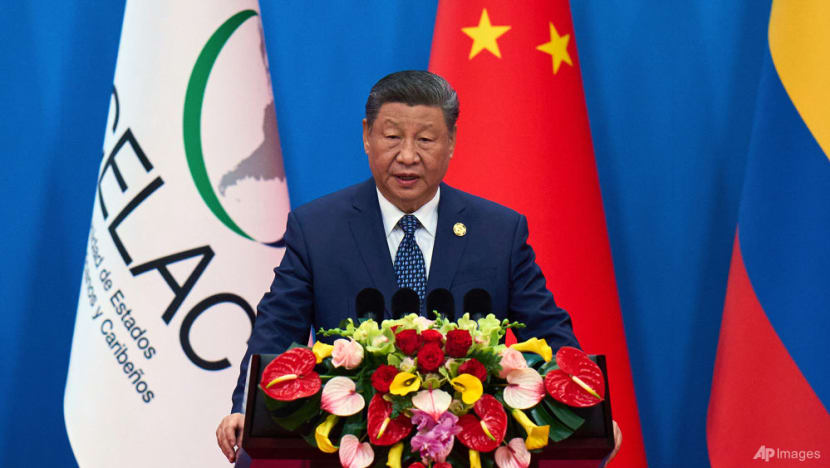China swipes at 'bullying' US as it woos Latin American leaders

Chinese President Xi Jinping delivers his opening speech during the opening ceremony of the Fourth Ministerial Meeting of the Forum of China and Community of Latin American and Caribbean States at the China National Convention Center in Beijing on May 13, 2025. (Photo: AP/Andy Wong)
BEIJING: China took thinly-veiled swipes at the United States and cast itself as the defender of the multilateral order on Tuesday (May 13), as it sought to deepen ties with Latin American and Caribbean leaders at a summit in Beijing.
Promising billions in development credit and increased cooperation, President Xi Jinping told the China-CELAC Forum - without naming the United States - that "bullying and hegemony will only lead to self-isolation".
Latin America has emerged as a key battleground in US President Donald Trump's confrontation with China, and the region is coming under pressure from Washington to choose a side.
Two-thirds of countries there have signed up to Beijing's Belt and Road (BRI) infrastructure drive, and China has surpassed the US as the biggest trading partner of Brazil, Peru, Chile and others.
A day after Washington and Beijing dialled down the trade war raging since Trump took office by drastically reducing mutual tariffs for 90 days, Xi cast Beijing as a defender of peace and stability.
"There are no winners in tariff wars or trade wars," Xi said.
"Only through unity and cooperation can countries safeguard global peace and stability and promote worldwide development and prosperity," he said.
The Chinese leader pledged US$9.2 billion in loans towards "development", part of a broad set of initiatives aimed at deepening cooperation, including on infrastructure and clean energy.
Beijing will also cooperate in counterterrorism and fighting transnational organised crime, Xi said, as well as enhancing exchanges such as scholarships and training programmes.
Under Monday's agreement, the United States agreed to lower its tariffs on Chinese goods to 30 per cent while China will reduce its own to 10 per cent.
The deal marked a major de-escalation of a gruelling trade war between the world's two largest economies, which threw global markets into turmoil.
But tensions remain; a 20 per cent levy over Trump's complaints about Chinese exports of chemicals used to make fentanyl - an opioid drug that has killed thousands of Americans - remains in force.
Beijing's foreign ministry demanded on Tuesday that the US "stop smearing and shifting blame" for the opioids crisis.
"MIGHT MAKES RIGHT"
Also without naming the United States, Xi's top diplomat made clear Beijing's displeasure with Washington as well.
Speaking alongside Latin American counterparts, Wang Yi condemned a "major power" being "obsessed with the idea that might makes right".
He urged Latin American nations to "join hands" with China to defend their rights against a country that is "using tariffs as a weapon to bully other countries".
Among notable attendees at the forum is Brazilian President Luiz Inacio Lula da Silva, who arrived in Beijing on Saturday for a five-day state visit.
Addressing the delegates, Lula said his region did not "want to repeat history and start a new Cold War".
"Our goal is to be an asset to the multilateral order for a global good, and to be duly represented," he explained.
In talks with his Brazilian counterpart later on Tuesday, Xi said the two countries should "strengthen cooperation" and together "oppose unilateralism", according to a Chinese state media readout.
The two countries issued a joint statement saying they "welcome Russian President Vladimir Putin's proposal to start peace talks" with Ukraine, calling direct dialogue "the only way to end the conflict", Chinese state news agency Xinhua said.
Also present at the forum was Colombian President Gustavo Petro, who called for "dialogue between civilisations" that took into account the interests of the region.
Petro has said he intends to sign an accord to join Beijing's trillion-dollar BRI initiative during his visit.
Chilean President Gabriel Boric also told the forum that his country would take a "leap forward in economic relations with China".

















